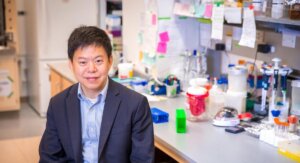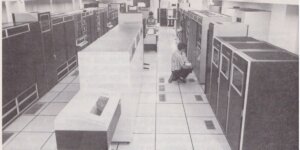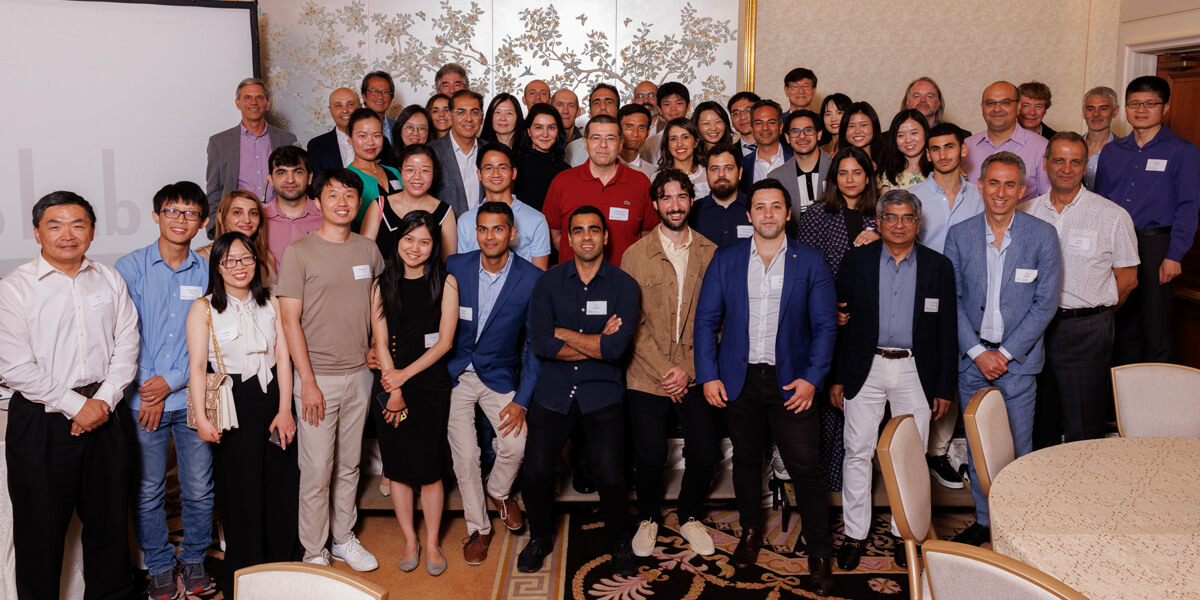
On the evening of June 29, the InfoLab hosted more than 60 guests, including alumni, sponsors and collaborators to commemorate the lab’s landmark anniversary. Photo/Brian Morri.
Twenty-five years ago, Computer Science Professor Cyrus Shahabi, an expert in information management, created InfoLab as a hub of data analysis and discovery at the University of Southern California.
From humble beginnings with only three students, Shahabi’s unique approach of bringing together multidisciplinary teams, world-class collaborators, and bold end-to-end solutions fueled a quarter of a century of pioneering research, from predicting traffic flow and creating virtual worlds to analyzing location data for social good.
In 2010, he brought this collaborative team approach to a new role as director of the Integrated Media Systems Center, a multidisciplinary informatics research lab that tackles fundamental data science problems, with applications in transportation, health, media, and smart cities.
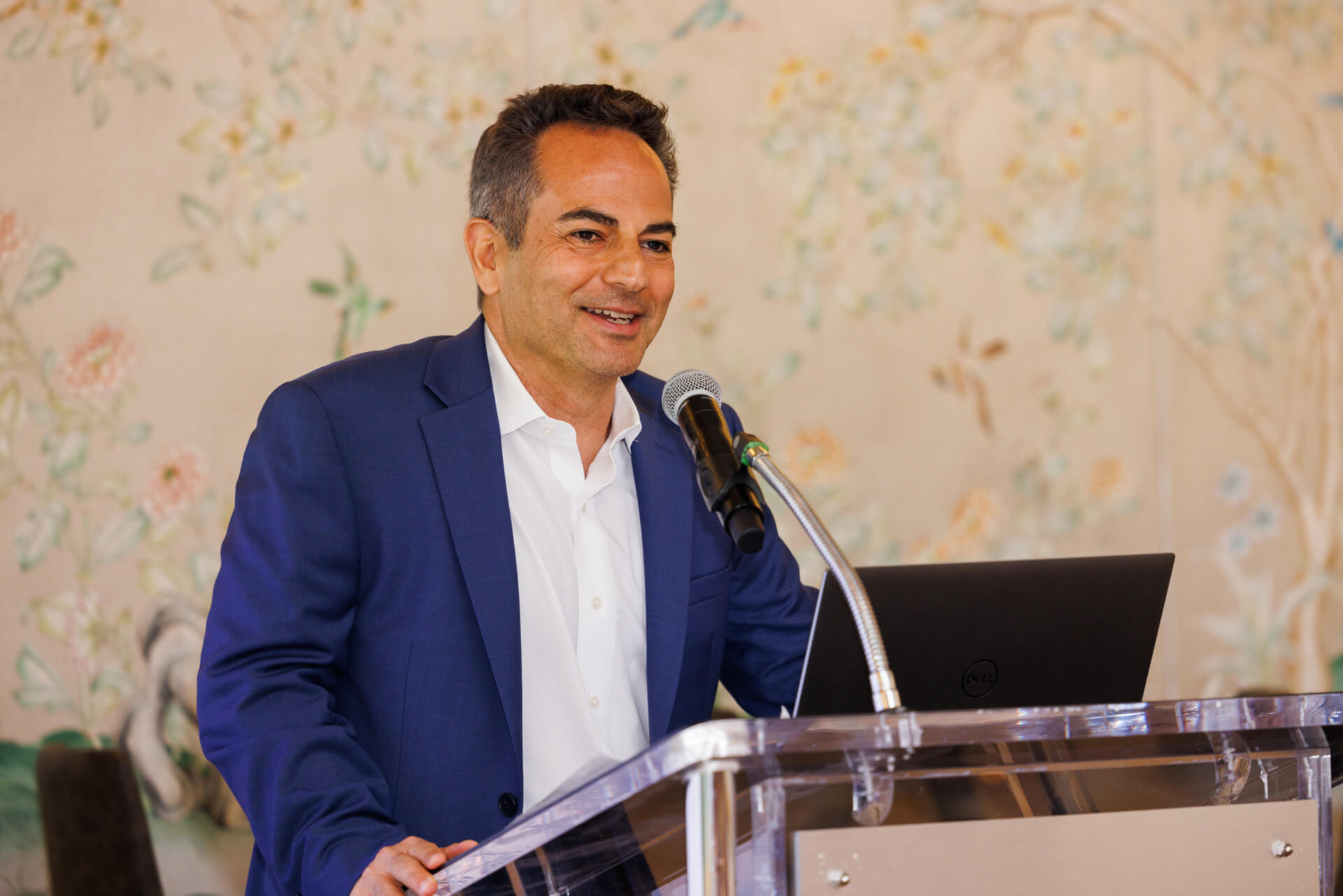
Twenty-five years ago, Computer Science Professor Cyrus Shahabi, an expert in information management, created InfoLab. Photo/Brian Morri.
To commemorate the InfoLab’s landmark anniversary, on the evening of June 29, the lab hosted more than 60 guests—including alumni, collaborators, sponsors, and staff—for an evening of celebration in Los Angeles.
Since its inception, 37 Ph.D. students have graduated from the lab, and several alumni in attendance now hold impactful leadership positions in top tech companies such as Google, Snap, Meta and Apple, and faculty positions at leading universities, including UC San Diego; University of Colorado, Denver; and the National Tsing Hua University, Taiwan.
The event also celebrated the close of Shahabi’s five-year tenure as chair of the Department of Computer Science. During this time, the department has grown to more than 4,500 students, 90 faculty, and 20 staff, with 17 tenure-track faculty members hired during his tenure.
He also founded the Industry Affiliates Program—with members including Google, Lyft, and Microsoft—and oversaw the planning of the Dr. Allen and Charlotte Ginsburg Human-Centered Computation Hall, a new home for computer science at USC.
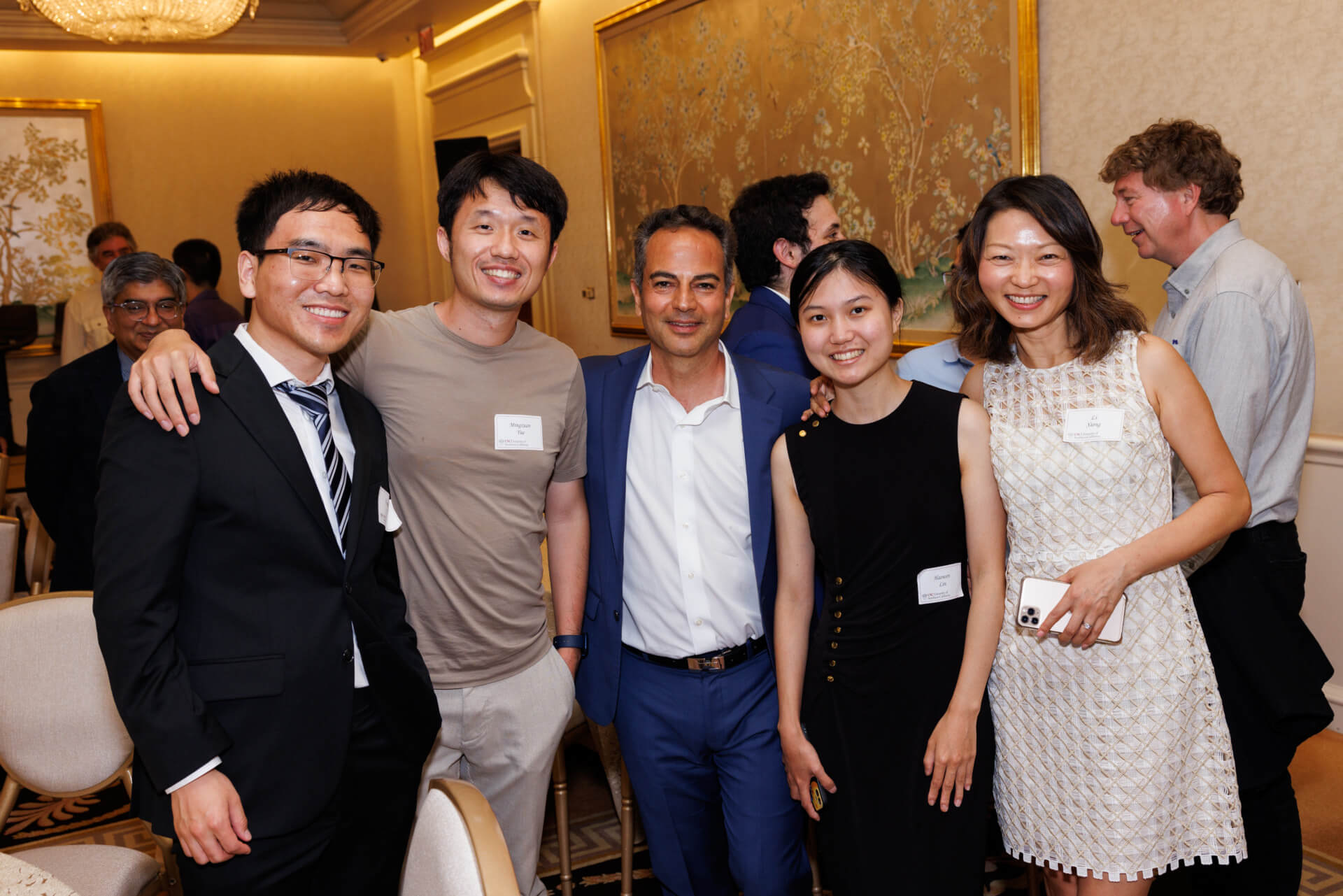
Cyrus Shahabi, center, with InfoLab alumni and collaborators. Photo/Brian Morri.
A second home
During an open mic session, many alumni shared how the InfoLab experience positively impacted their careers, and how Shahabi’s leadership style fostered friendship, collaboration, and teamwork.
Alumnus Ugur Demiryuek (2012), a research scientist at Apple, joined Infolab as a Ph.D. student after working in the industry for several years.
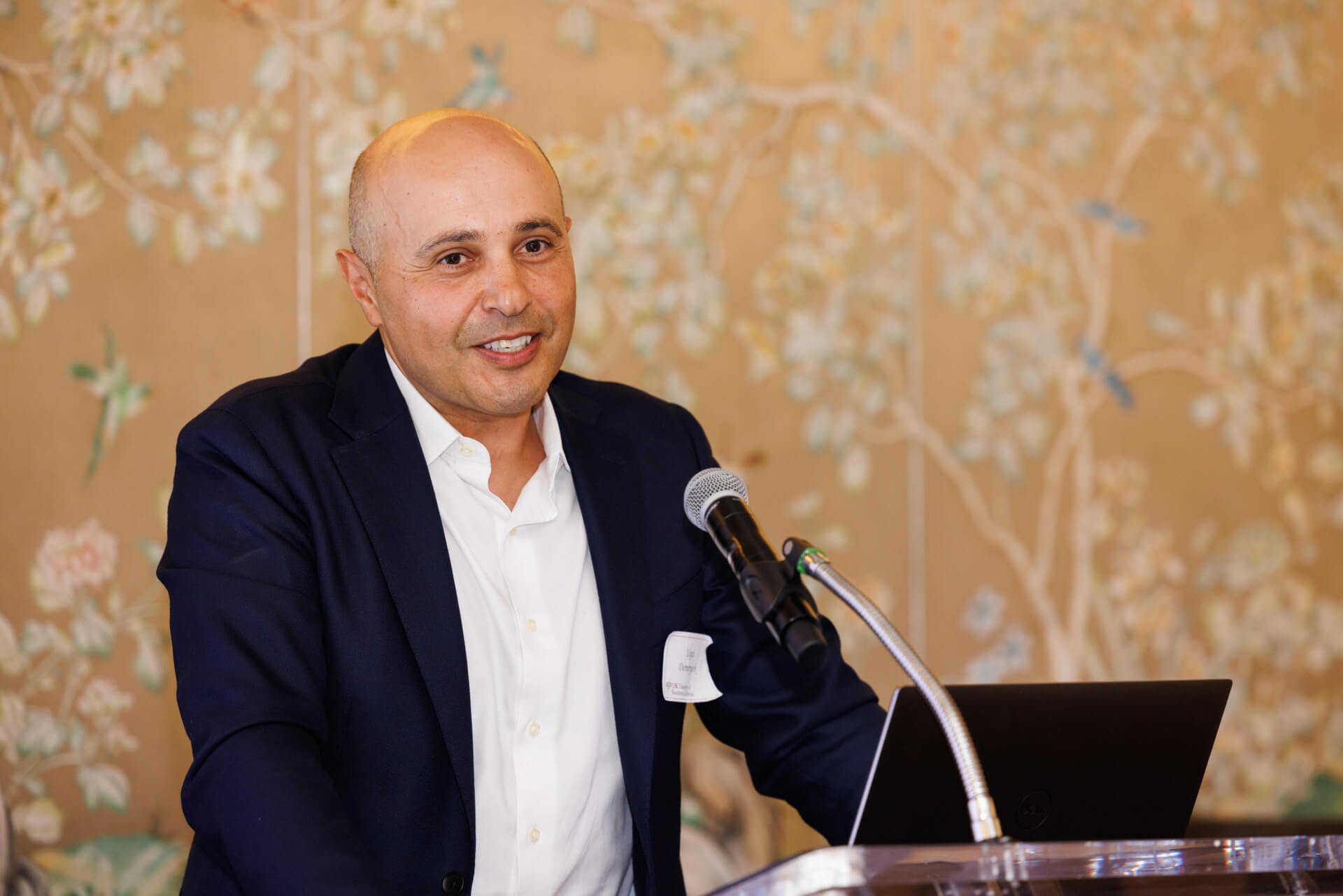
“It became a home for me.” Alumnus Ugur Demiryuek, who launched a startup with Shahabi in 2012. Photo/Brian Morri.
“As the oldest student in lab, my first son was born during this time,” said Demiryuek. “It became a home for me. I learned how to present my work and how to tell the main idea, which I still find useful in my work at Apple. I learned to fall in love with the problem first, and the solutions will follow.”
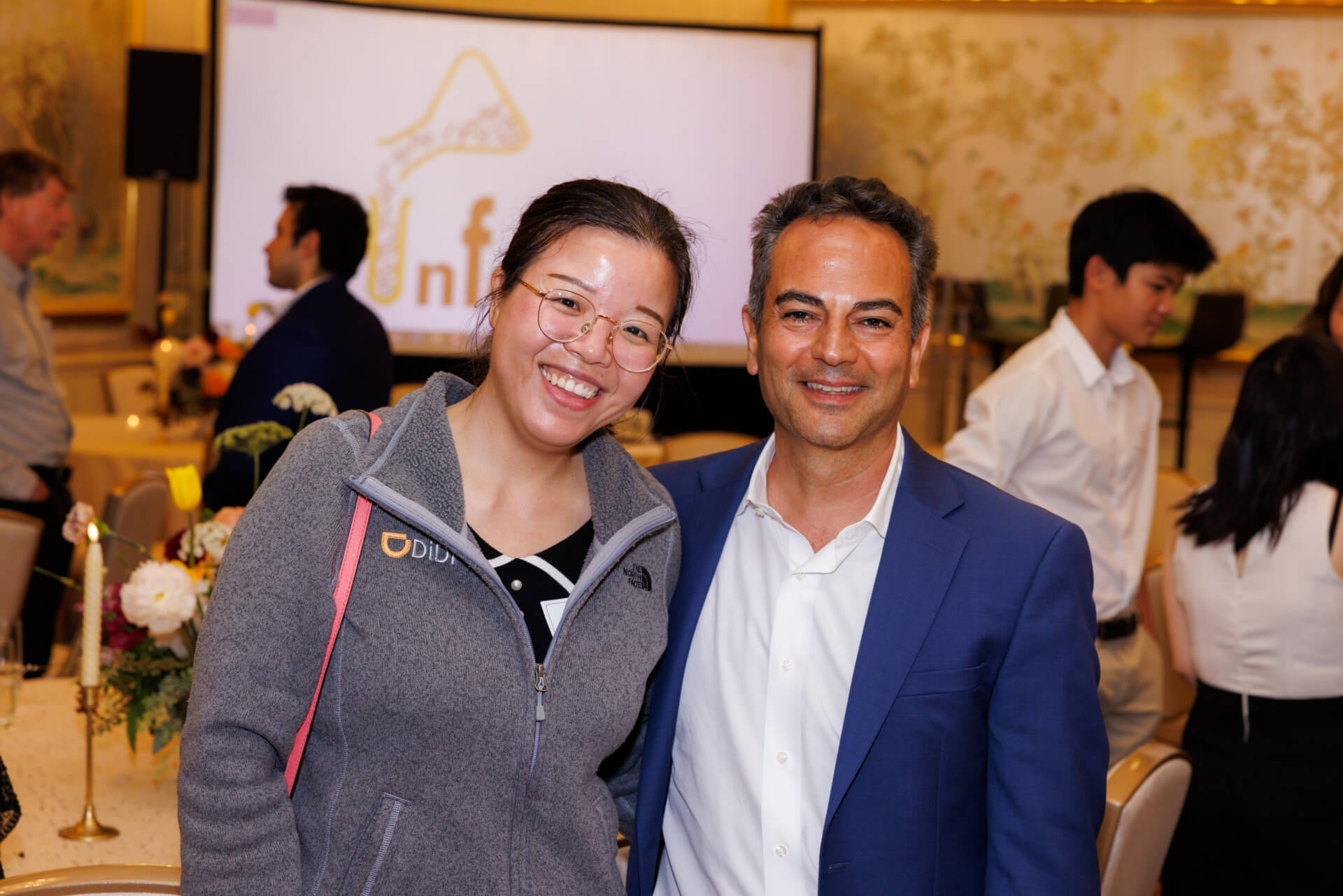
Alumna Ying Lyu, a machine learning engineer at Airbnb, and Cyrus Shahabi. Photo/Brian Morri.
The concept of the lab as a second home echoed throughout the speeches at the celebration. Alumna Ying Lyu (2018), a machine learning engineer at Airbnb, recalled Shahabi’s kindness towards her as a new lab member, far from home for the first time without her network of friends and family. Over time, she forged friendships with her InfoLab colleagues, and is now happily settled in the US with a family, she said.
Mehdi Sharifzadeh (2007), now an engineering director at Meta, agreed: “InfoLab was not just a research lab, it was ‘The Place.’ I found a lot of friends and connections through both USC and the lab.”
Lifelong lessons
Alumni also shared the lifelong tips gleaned from working at the lab.
“Something I learned from Cyrus is that when you can say your thesis in a few sentences, you’re ready,” said Mehrad Jahangiri (2008), director of engineering at Snap. “The first year was hard – this was the first time I experienced failure,” said Farnaz Azmoodeh (2005), VP of engineering at Snap. “But I was so lucky to experience that at InfoLab.”
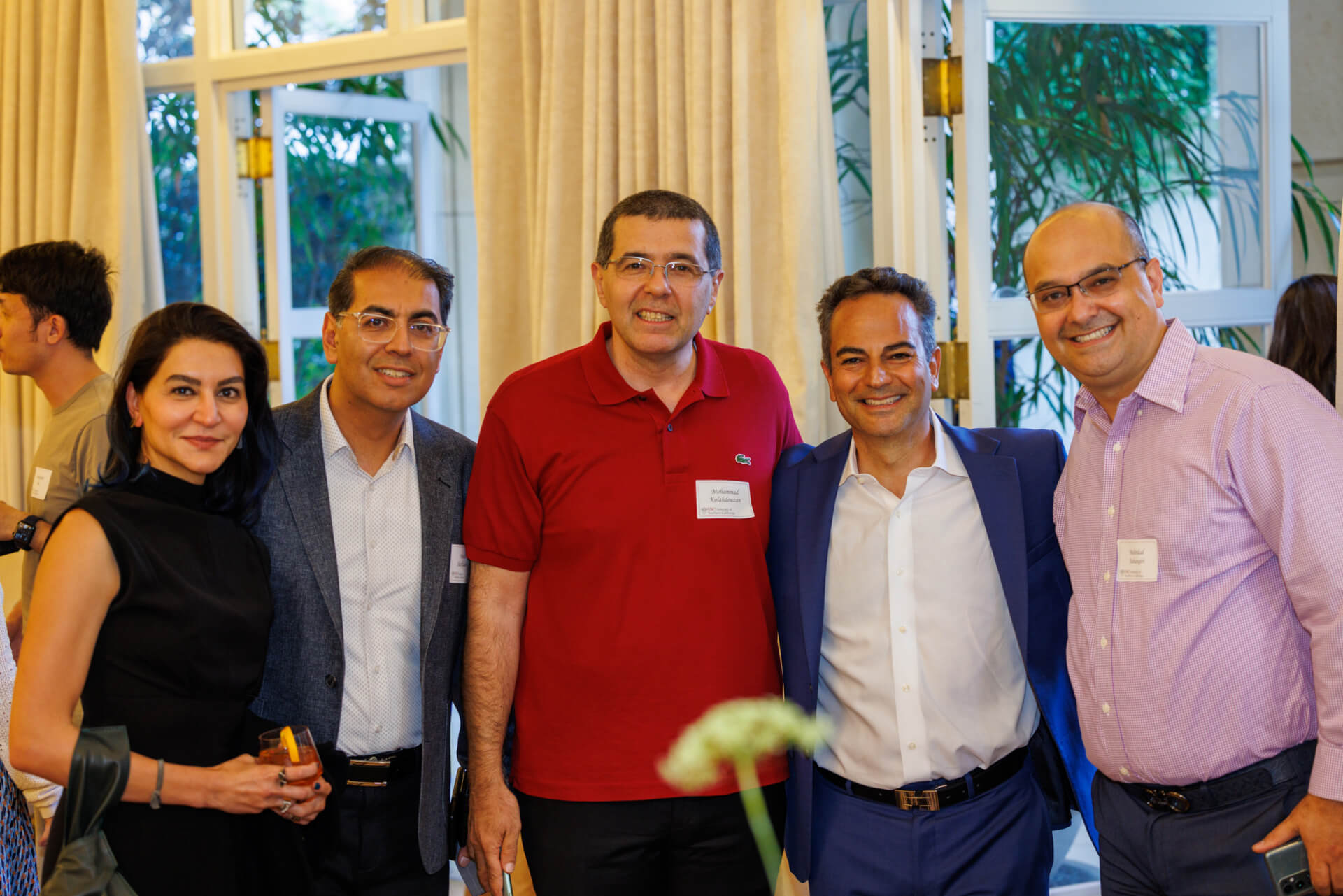
More than 60 guests attended InfoLab’s 25th-anniversary celebration. Photo/Brian Morri.
According to Ali Khodaei (2013), a project manager at Google, “The lab taught me the concept of service; you must give back. Cyrus created an environment to take care of students, or the servers and websites. Ten percent of your time, you had to give back—he created such a good environment, and all of us helped each other.”
YaGuang Li (2019), a senior research engineer at Google Brain, shared the skills he learned as a student at the lab.
“I learned about the importance of abstract thinking … to deliver the most important message first,” said Li. “I also learned to try to build something that’s practical; a product that can potentially be used by millions of people. That motivates me to try to do something novel, but also something that can be useful and benefit society.”
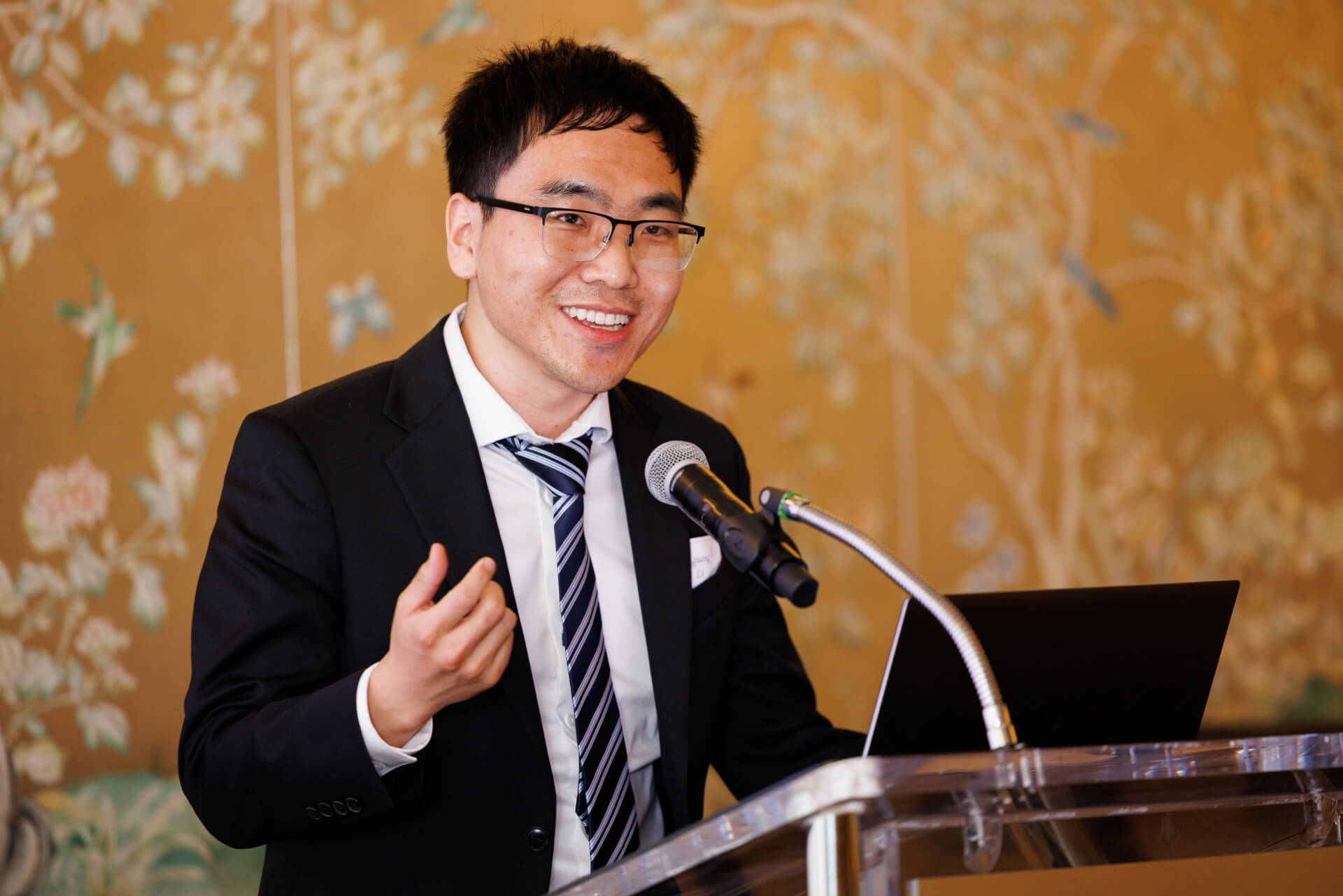
“I learned about the importance of abstract thinking.” YaGuang Li is now a senior research engineer at Google Brain. Photo/Brian Morri.
Attracting the best
The event featured a panel session with alumni, sponsors, and collaborators, moderated by Roger Zimmermann, a collaborator and professor at the National University of Singapore, who flew in for the occasion. During this session, many speakers acknowledged the support and contributions of Shahabi and his students.
“Cyrus was so passionate, and from visiting the lab, I could see that engagement with the students,” said Dan Fay, head of strategic research collaborations at Microsoft. “As a sponsor, you’re looking for good research, but also for someone who is passionate about it – you bet on the person as much as the research itself.”

Mehdi Sharifzadeh, Dan Fay and John Krumm. Photo/Brian Morri.
The InfoLab students’ caliber was emphasized by Luc Vincent, VP of engineering and product group lead at Meta and longtime InfoLab collaborator, who first met Shahabi 15 years ago when Vincent was working at Google.
“It was obvious his research and interests were very similar to what we were doing, and he was someone I could collaborate with,” said Vincent. “This led to a number of collaborations, with students coming to work with us as interns, and we got a few Google research awards, and eventually became a sponsor of the lab, so it’s been a long collaboration.”
This was echoed by John Krumm, a senior principal researcher at Microsoft, who put it simply: “Cyrus has always attracted the best.”
Secret of success
Under Shahabi’s leadership, InfoLab has pioneered fundamental research in the areas of spatial crowdsourcing (a term coined by Infolab); road-network queries and navigation; location privacy; spatiotemporal indexing and queries; and geospatial information integration.
In addition to publishing more than 400 papers in top-tier journals and conferences, the lab has received funding from prestigious government agencies such as the National Science Foundation, the National Institute of Health, the National Geospace-Intelligence Agency, the National Institute of Justice, NASA, and tech-industry leaders, including Microsoft, Intel, Oracle and Google.

Panel speaker and alumna Rose Yu (2017), now an assistant professor at the UC San Diego Jacobs School of Engineering.
As to the secret of InfoLab’s success and longevity, Shahabi, who holds more than 14 US patents, points to a powerful blend of sophisticated fundamental research and technology with real-world impact.
“Infolab goes above and beyond an academic research unit by developing real-world end-to-end systems as proofs-of-concept for fundamental research,” said Shahabi. “This is not typical in academia, and I believe this is a strong draw for industry sponsors and a reason why my students end up with top positions in industry. This research is as real as it gets.”

Making an Impact: Five InfoLab Tech Transfers
1. Traffic forecasting
InfoLab researchers developed a traffic management data system, called ADMS, which offers ways to find the fastest routes or nearest points of interest while considering the “forecasted” traffic, allowing researchers and developers to learn more about traffic patterns than ever before.
Funded by LA-Metro and several tech companies, including Microsoft and Intel, it resulted in three licensed patents on technologies for car navigation systems. In 2012, Shahabi and his Ph.D. student, Ugur Demiryurek launched a company based on this technology called ClearPath (later TallyGo), which was acquired by a logistics and delivery company in 2019.
2. Multimedia data visualization
An experimental software project called GeoDec uses 3-D geospatial models—layers of data and real-time video—to deliver real-time data layering (think: Minority Report). Some of the underlying technologies from this research project resulted in six patents to automatically fuse various types of data, such as images and text documents, on top of satellite and aerial imagery.
These patents have been licensed and/or used by Shahabi’s startup, Geosemble Technologies, to develop multiple products. In 2012, Geosemble became an InQTel portfolio company and was subsequently acquired by Terrago Tech., another InQTel portfolio company.
3. Multimedia data acquisition
Media Q is a mobile media management framework to collect, organize, search, and share user-generated mobile images and videos crowdsourced by the public. The system automatically geotags video uploads from users’ smartphones on a map, while also adding metadata so media content can be pinned with directional accuracy. It has been used for citizen journalism and by the National Geospatial-Intelligence Agency for disaster management.
4. Collecting and managing massive amount of data
ProDA is an award-winning methodology that utilizes wavelets—powerful mechanisms for analyzing and processing digital signals—to efficiently access data. The results have been used by Chevron to store and access oil reservoir sensor data and software was licensed to JPL to store and progressively visualize earth observation data collected by NASA satellites.
5. Privacy protection
Recent research in the lab has focused on improving data privacy and privacy-preserving machine learning approaches, specifically allowing people to protect their location privacy, while still benefiting from location-based services. Due to the COVID-19 pandemic, this problem came to the forefront of discussions around contact-tracing, and the lab developed a real-time contact tracing application with privacy at the forefront.
Published on July 21st, 2022
Last updated on July 25th, 2022




